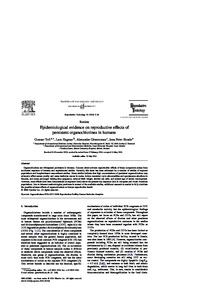Epidemiological evidence on reproductive effects of persistent organochlorines in humans

Toft, Gunnar ; Hagmar, Lars ; Giwercman, Aleksander ; Bonde, Jens Peter
2005
99
118-125
abortion ; antifertility effects ; chlorinated hydrocarbons ; epidemiologic study ; exposure ; genito urinary system diseases ; reproductive hazards
Occupational risks
English
Bibliogr.
"Organochlorines are widespread pollutants in humans. Concern about adverse reproductive effects of these compounds arises from accidental exposure of humans and experimental studies. Recently, this issue has been addressed by a number of studies of exposed populations and hospital-based case-referent studies. These studies indicate that high concentrations of persistent organochlorines may adversely affect semen quality and cause testicular cancer in males, induce menstrual cycle abnormalities and spontaneous abortions in females, and cause prolonged waiting time pregnancy, reduced birth weight, skewed sex ratio, and altered age of sexual development. However, most effects have been demonstrated at exposure levels above the present day exposure level in European and North American populations. Due to inherent methodological problems in several of the available studies, additional research is needed to fully elucidate the possible adverse effects of organochlorines on human reproductive health."
Digital
The ETUI is co-funded by the European Union. Views and opinions expressed are however those of the author(s) only and do not necessarily reflect those of the European Union or the ETUI.